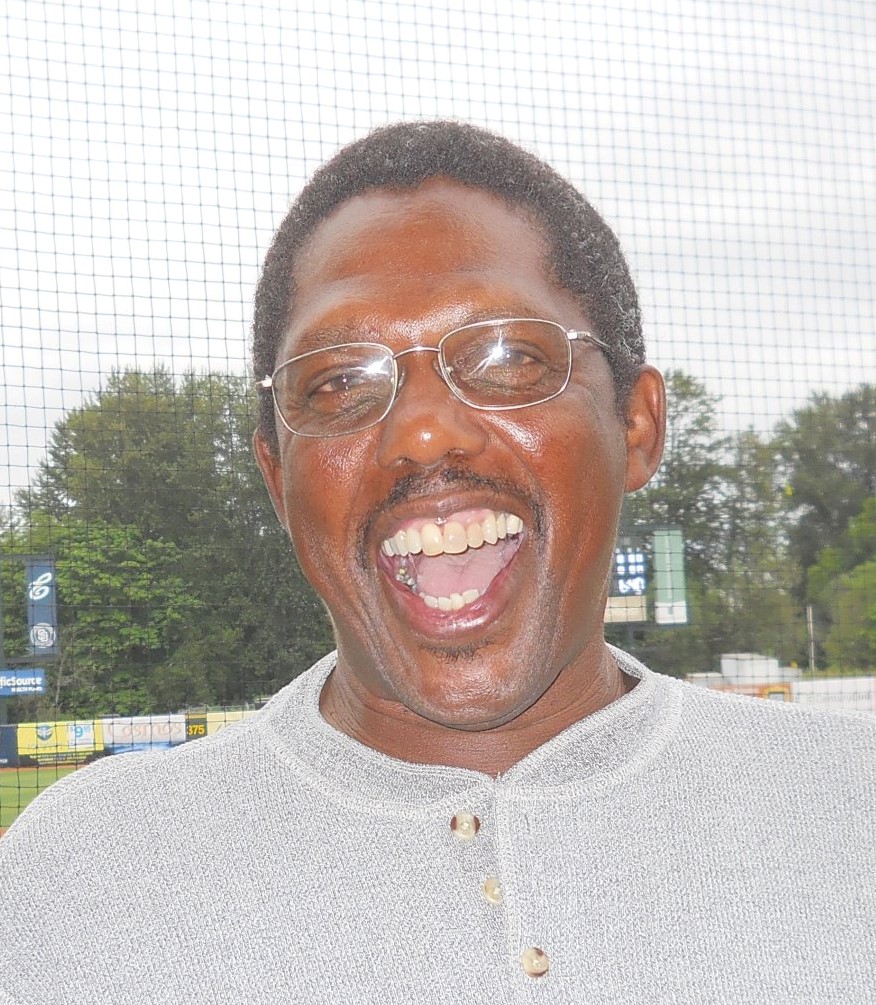Outfielder and leadoff hitter George McPherson has been described as the engine that made the 1975 Eugene Emeralds go. He’s one of the all-time most-popular Eugene players, and he still lives and works in his adopted hometown.
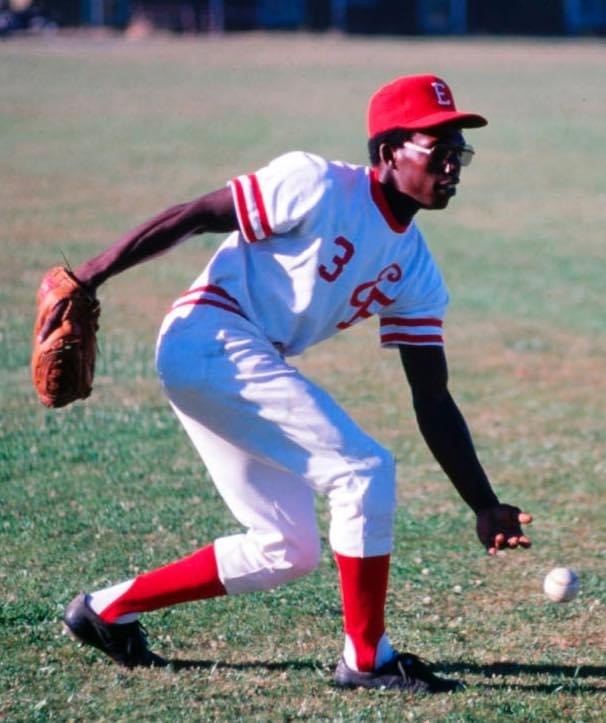
Jim Haught They’ve got you listed in Baseball-Reference at 5’9”, 155 pounds. So not a big guy, but apparently you could go get ’em, huh?
George McPherson Yeah, I had the ability to take a ball off the bat, turn and run to a spot, turn around, and be there waiting for it.
JH So you could track them real well.
GM Yes, and I had an above-average arm. I had a pretty good arm, so my arm and my speed made up for my small size.
JH And was baseball always your primary sport, or did you play ’em all, and just excelled at that the most?
GM I pretty much played basketball, soccer, and baseball. And because soccer was not a major sport at the time, and basketball — unless you were over six foot — you didn’t have a chance. So I stayed with baseball, and ultimately it became my major sport.
JH How did you get started in youth baseball as a kid?
GM I had played Little League in San Diego. A friend of mine’s dad was a Maytag washer repairman. He was our Little League coach, and Larry and I played together. And so we played, made the All-Star team. Then I went on to play Legion ball, and I tried to play high-school ball, but the coach’s best friend’s son – my best friend — and I competed against each other. So I sat on the bench, and halfway through the year, I decided to go out for track and ran track.
Then I went out again when I went to junior college [San Diego Mesa]. And from there I went on and earned a scholarship at San Diego State. And that’s how I ended up with my baseball career.
JH So you essentially didn’t play high-school ball at all! Played in junior college, then played for San Diego State, and ended up where you signed as a free agent?
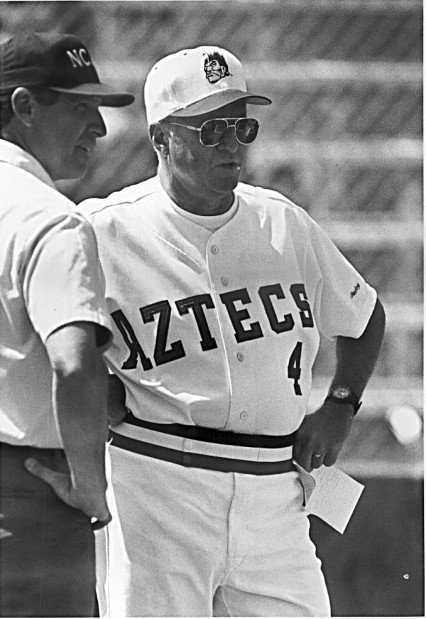
GM I was signed as a free agent. What was ironic about that was that Larry Barton [of the Reds] was trying to get me signed, but they were hemming and hawing because they couldn’t make up their mind. So Jim Dietz, my college coach, suggested I come up to Eugene to try out for their independent team. So I came up with one of my friends, Steve Callahan, who also played at State and tried out for the Eugene team.
And that afternoon Hugh Luby [Eugene manager/GM] said, I’d like to sign you. And I said, well, I’m waiting for Larry Barton to give me a call, because the Reds are interested in me. And he said, well, I’ll give you a day or two. And I said, okay. And I signed two days later.
And the very next day, Larry Barton calls and says, well, we’d like to sign you. And I said, I’m sorry, Larry. I’ve already signed with Eugene, because I want to play ball. And the Reds were dragging their heels. So that’s how I ended up in Eugene.
JH And ironically, the next year they’re affiliated with Cincinnati. So you ended up with them anyway.
GM Correct.
JH When you were coming along through junior college and San Diego State, were you always an outfielder and the leadoff guy? Was it an obvious place for you to be, or how did your playing develop th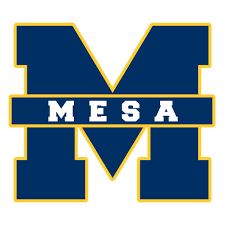 ere?
ere?
GM Well, at San Diego Mesa, I was an outfielder. That’s the position I tried out for, because I had the speed and I played the outfield. So I was assigned to play center field. And that’s where Jim Dietz from San Diego State saw me play. And he liked the way I covered the outfield. Plus, I was a leadoff hitter at Mesa.
And then when I went to San Diego State, I started out as a backup my junior year. My senior year, the regular centerfielder got sick, and he never played center field again, the rest of that year. And I played center field and set the stolen base record: 37 out of 40.
JH So it was pretty much outfield all the way for you?
GM Yes.
The 1974 Emeralds were an independent team; for 1975 they were affiliated with the Cincinnati Reds.
JH You get to Eugene, and again you’re the centerfielder and leadoff guy. But it’s an independent team. You still have the same role, basically, the following year [1975]. What were the differences to you between being an independent in Eugene and being affiliated?
GM Fortunately, there wasn’t much difference, because Hugh Luby, who had also played professionally and managed in the PCL, he and Joe Verbanic — who was our pitching coach and who had pitched for the New York Yankees — they were both professional.
And I guess the main difference is that in 1975, there were fewer independent teams. The Portland Mavericks, I believe, and Tri-Cities were the only two independent teams in 1975. And the organizations were a lot more “organized.” And the Reds, as you know, were very organized; very concrete in that era of time.
George gained an unusual ally in early 1975:
GM I learned a lot from Ron Plaza. I know a lot of people didn’t like Ron, but Ron and I hit it off in spring training of 1975. And I appreciate it. And he liked me as a ballplayer. So he would ride my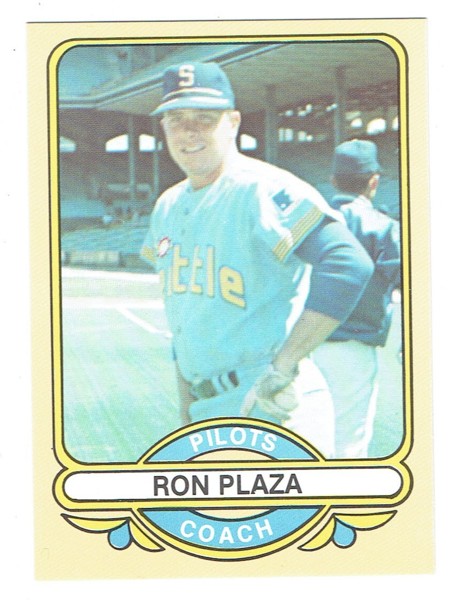 back when I screwed up. But when I did things well, he complimented me on it. So he had a lot to do with me staying in there and being progressive.
back when I screwed up. But when I did things well, he complimented me on it. So he had a lot to do with me staying in there and being progressive.
JH It’s a good thing he was on your side, because apparently if he wasn’t, there was just no end to it. But it it’s nice that he was able to see your talent and be on your side about it.
GM Yes. He was — Ron Plaza was a unique individual and he refused to allow you not to give it a hundred percent, if he saw what you were capable of is the best way to put it.
JH And you obviously thrived in both situations — independent and affiliated teams. John Harrison [Ems teammate 1974-75] says you were the fan-favorite both years: when he rejoined our team in 1975, the crowd just went nuts! He also called you The Fresh Prince of Eugene and The Mayor of Eugene.
GM That is true. Well, I tell you the truth: In 1976, they had a George McPherson Night and presented me — they flew my mom and my baby brother up, presented me with the plaque as their Most Favorite Ballplayer in 1974-1975-1976.
JH John also said that you might’ve been the fastest guy he ever played with. Were you always a speed guy, or did that develop for you?
GM No, I was always pretty quick on my feet. I was one of the fastest. On a bunt I was 3.5, 3.6 seconds down the line, and on a full swing, I was always consistently 3.8, 3.9.
JH You’re up there in a Griffey level! That ball deep in the shortstop hole might’ve been a pretty tough play for most guys, I imagine.
GM Yes. It was actually a funny story:
When I was planning for the Ems in 1974, I hit a ball to shortstop, and it took three or four bounces. And I beat it to first by a step. And the umpire called me out! I looked at him like — his name was Frank Jackson — I go, Frank, how could you call me out? I was a step past the base!
He said, no one’s supposed to beat that play out!
JH Oh, so you were out because you were supposed to be out?
GM Right. But I’ll tell you, Jim, from that point on, he never called another play until it was totally complete.
JH Good idea!
GM Exactly. Yeah. A lot of guys just assumed a routine play was a routine play.
JH Not with somebody that fast, it’s not.
GM No, it woke his eyes up, and he never made that mistake again. So I complimented him for it after he retired.
JH And were you using that speed as a get-on-base kind of guy; you’ve been called the engine of the 1974 and 1975 teams, because you got everything going.
GM I was the leadoff hitter both years, and my job was to get on base. I would basically try to bunt a ball at least once a game, because I fortunately had the ability to bunt the ball in four different places on the infield and usually beat it out, because I had pretty good bat control. And if I got on base, I’d steal second base most of the time. And the guys behind me, they hit me in. So if I got on, we scored runs and that was my job.
JH Gee, they sure wouldn’t have appreciated your skillset today, though. It sounds like you just didn’t have the right launch angle, George. [derisive laughter]
GM No! Well, me and launch angle aren’t the best of friends. Jim, you look at it today; look at the batting averages. You know, you’re a major-league player and you’re hitting .220-.230 —
JH With 25 home runs, 75 driven in, and 185 strikeouts.
GM Yeah, exactly.
Well, fortunately I had the ability in the outfield to pretty much flag down anything from center field and even right, and I had a pretty strong arm. That was my forté.
JH Greg has said that majors or minors, you were the best defensive centerfielder he ever had.
GM Yes, he did. He told the Padres big-league team that when he was managing the San Diego. That was probably my largest compliment from anybody in pro ball, when he made that statement. He still says it to this day. So I have to believe that he knew what he was talking about, and it makes me pretty proud to have played for him.
JH I see 32, 28, 27, 23 stolen bases here. You were picking them up and putting them down.
GM Yeah, when the guys would let me run without hitting the ball! You think that, but to be honest, our team batting average, I think was like .307 or something in Eugene that year, and everybody hit – the pitchers, everybody. [Actually .282, including all pitchers; but three pitchers hit .300+]
JH Yeah. Moskau at .311.
GM Yeah. He had a few home runs, too.
JH Yeah. I think he’s got three home runs and 14 runs batted in or something in like 75 at-bats. That’s pretty strong.
GM Yeah, he could hit the ball pretty good.
George joined the 1975 Emeralds after a short time in AA. Several players have commented that his return to Eugene – at roughly the same time pitcher Paul Moskau arrived after his college season was complete, and outfielder Lynn Jones and infielder John Harrison – gave the Emeralds the impetus to win the league championship.
GM Well, I know that after we were 12-12 or in that vicinity, we didn’t lose many games.
JH Right around the time that you and Paul joined the team, you guys were 8-6, and then it took off after that: up to 15-7, 24-10, 45-17. Everything was fine until about the last week of the season. And then you guys lost five of the last six. Do you recall that? Or remember what happened?
GM Yeah, that’s where Greg tore our butts up! [laughs]
That last week or so, Greg thought we were slacking off, because we knew we were gonna win our division. And so he ripped us a new one, and we came back and beat Portland in the playoffs.
It was funny because when we played Portland up there, we crushed them. And they had Jim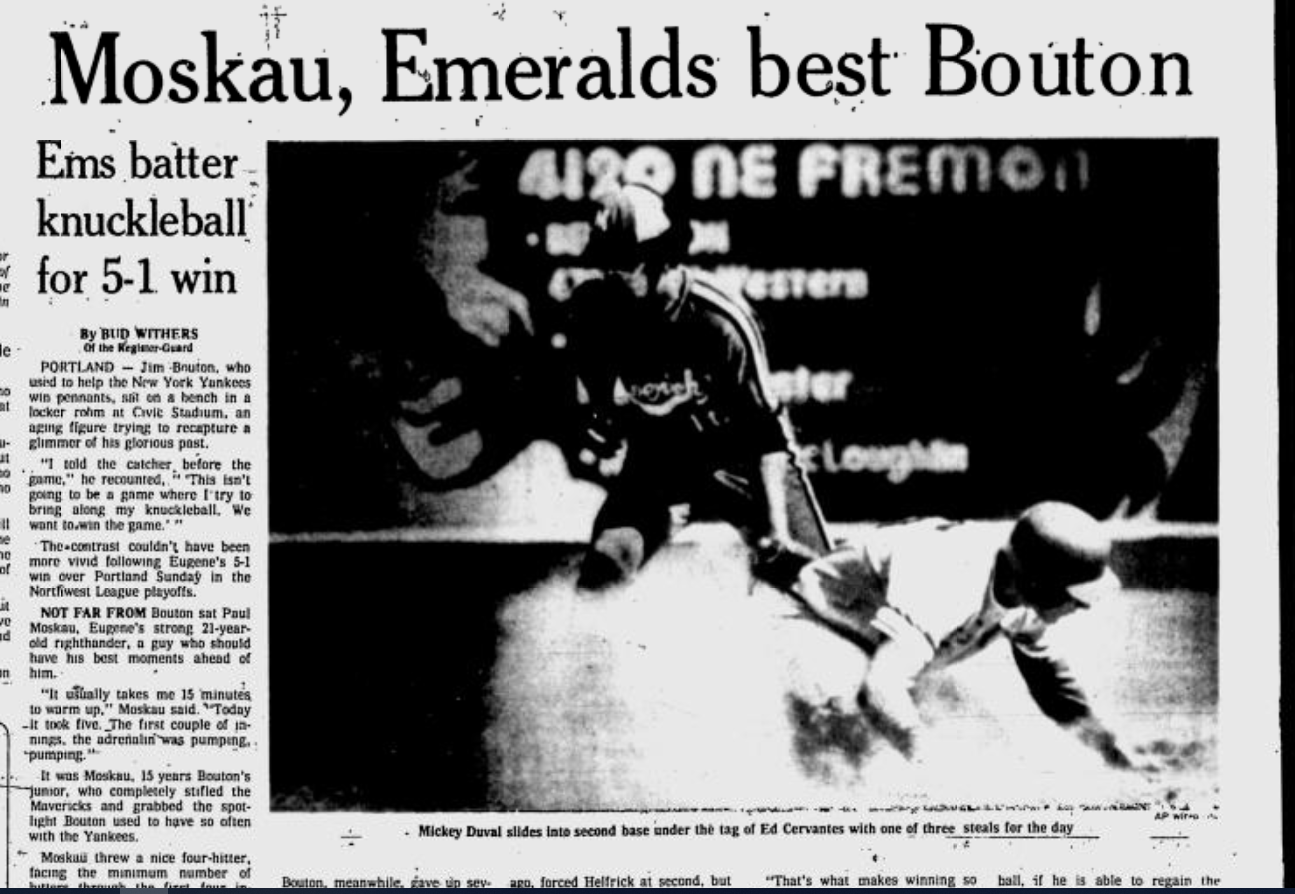 Bouton as their starting pitcher, and Jonesy [Lynn Jones] welcomed him to the Northwest League with a home run that went out on the street!
Bouton as their starting pitcher, and Jonesy [Lynn Jones] welcomed him to the Northwest League with a home run that went out on the street!
JH Several players have talked about that home run, like it might still be an orbit somewhere. I guess it was really a blast?
GM Oh yeah, it was a blast!
JH A 5-1 win in the first playoff game, over Portland and Bouton. And then John Underwood throws a 1-0 complete game for the championship. He and I talked about that, and it was amazing how different the approach was then than it would be now: that he never would’ve been able to go out for the ninth inning now with a 1-0 lead; a closer would have been coming in there. Or if he went out, as soon as somebody got on — which they did with one out — he would have been pulled.
But instead, a complete game that clinched the title for you guys.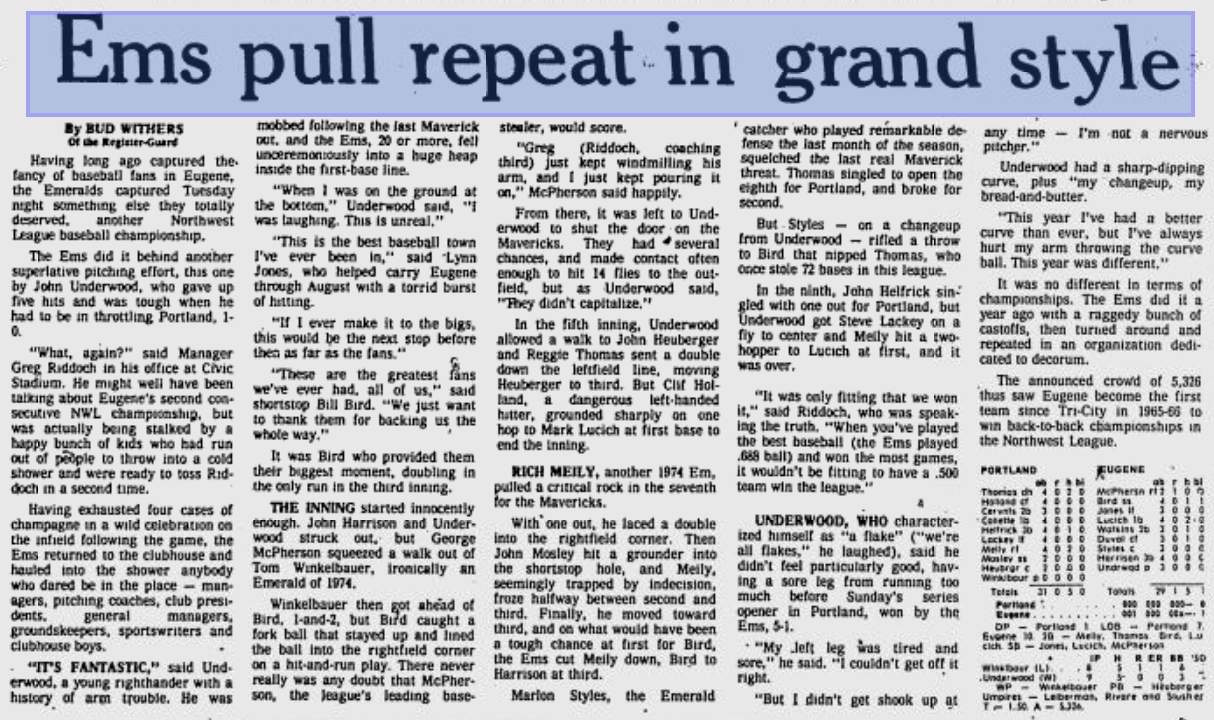
George was also involved in the two key plays of that 1-0 win:
GM John threw a hell of a game that day, and Greg let him pitch because he was in such control and such command of his pitches.
Portland only had one guy that even got to home plate. And fortunately it was a ball hit to right field, and I came up and made a one-hopper to the plate and we got him out. And then Billy Bird — I got on base, Billy hit a double down the right-field line and I scored our one-and-only run. So it was a team effort.
JH And in that last game, there were 14 flyball outs by Portland. I mean, the outfielders got their work in that day.
I asked John about it: was this Portland going to try to play hero-ball? Where everybody’s trying to jack it? Or was he just keeping them off-stride with movement or change of speeds? And he said he thought it was more just keeping away from the barrels [of the bats]; keep the ball away and let them get themselves out.
GM Pretty much that’s the way it was, because John had a hell of a changeup. And he mixed it in pretty well with his fastball and slider. They’d be out in front of the ball because his fastball and changeup, it was difficult to pick up the difference until it was too late. So that was pretty much why he kept them off stride the whole game, because he made his pitches so well, they never knew what was coming.
JH Must’ve been a lot of a front-foot hitting, then! And he had said that the breaking ball was what really did it for him — that whole season had a better one than he had had before, because it had given him arm problems, and it did later in his career also.
But he talked about that same thing: about the difference in speed between his fastball and changeup, and the other breaking balls were just kind of “show” pitches.
GM That was John’s gem of the year. I mean, he could do no wrong.
JH And what a great time to have it! Ironic that this team that hits so well scores only one run and gets a complete game to win the championship. And Portland scores one run in two games when they, evidently, thought they were just gonna come in and bulldoze you guys.
GM They had a pretty good team that year, but those two games — I think because we were such rivals — we made sure that Portland was not going to beat us.
The Portland-Eugene rivalry played out in interesting fashion during the 1975 season, and it showed the difference the arrival of George and Paul Moskau and Lynn Jones made for the Emeralds.
JH Portland won most of the early-season games. And then there were a ton of rainouts, and you guys played them seven games in five days, and beat them five times — even went 8-2 against them after the first part of the year. You guys had pretty well had their number, the second part of the season.
GM That second half of the season, we became complete as a team, with a consistent lineup. Every time we went out on the field, we had the anticipation of winning. That was our attitude.
Every time we went out on the field, we had the anticipation of winning. That was our attitude – on the 1975 Emeralds
One of the unique things about that team is that we gelled so strongly as a family and as a team. And that’s why we still have reunions still today: because as a group of individuals, we bonded so closely. And with Greg’s leadership, we just — I think that’s part of why we wanted to win for him — because of what he taught us as individuals and how we came together. Because I haven’t heard of any of us being unsuccessful in our later lives. And it all stemmed from that year.
JH The jelling — is that attributable to the addition of guys like yourself and Moskau about two weeks or so into the season? Was that the catalyst for that coming-together?
GM Yes. It was Paul, myself, and Lynn Jones and we had Mark Lucich and Barry Moss and John Harrison there already. And when Paul and I got there and when Lynn showed up, we just clicked. It was amazing how that team came together as one solid unit, because we all got along. Normally you hear fights and arguments among one player or another, but there was none of that in that group.
JH Do you think that’s attributable to the fact that you had some guys with more experience than would be typical for that league?
GM Well, that league has always been kind of a college-age group of individuals. And I think with our maturity, mixed with the few younger guys that we dealt with, that it was just a gathering of a group of mature guys helping the younger guys and the younger guys appreciated our ability to help them out, because we didn’t think that we were fighting each other for the same jobs or anything. We just joined together. And our main focus was to win and we wanted to win as a group.
There will never be another year like that. – on the Emeralds’ 1975 season
JH It’s nice that you guys have that to hang on to, and that you’re still tight after all this time. And it obviously had such a big impact on everyone I’ve talked to from that team.
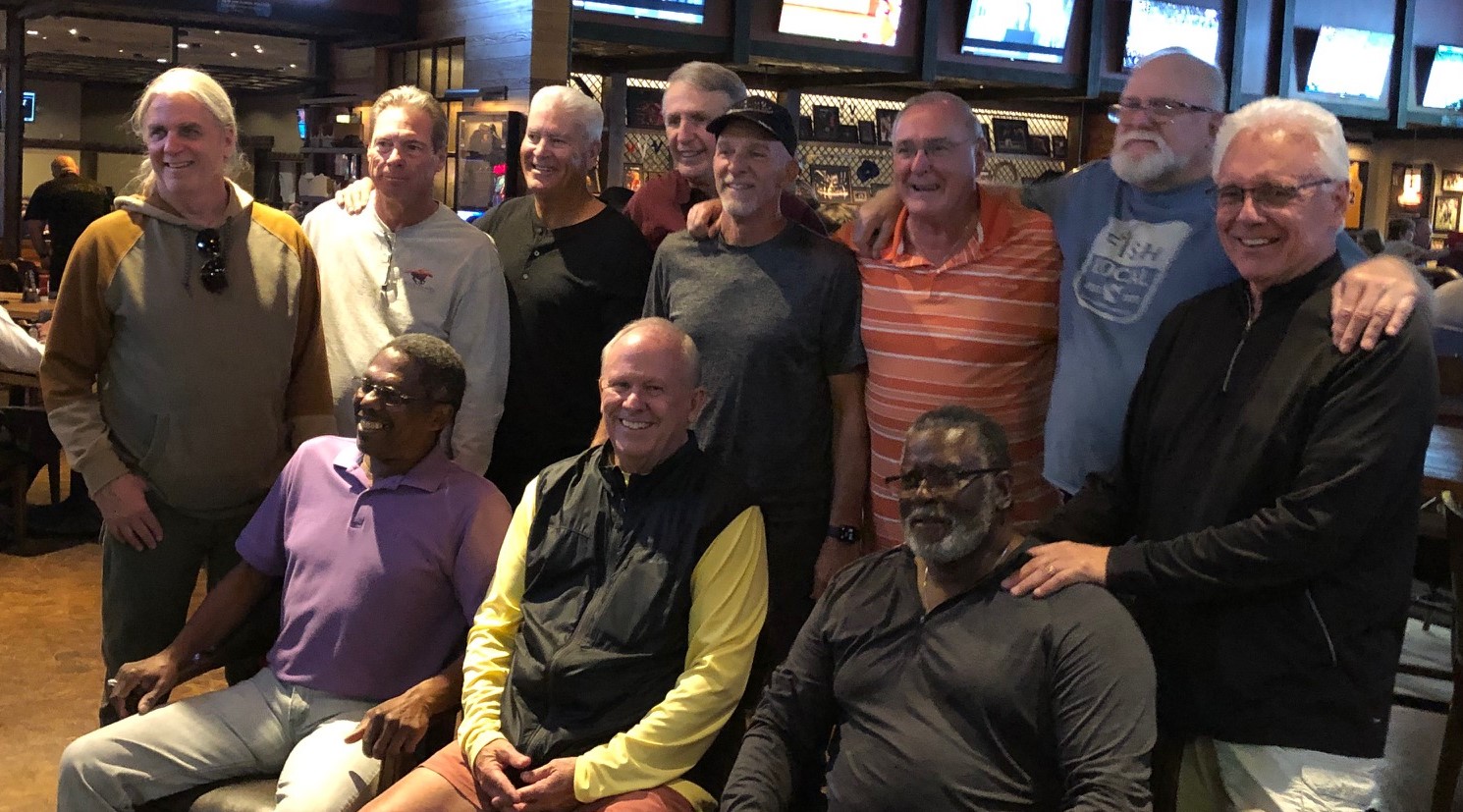
GM We were like a family, and I think the biggest thing about that team that year is that we grew to be a big family. And to this day, we stay in contact with each other. We have reunions every couple of years, just to get together and reminisce, and see how everybody’s doing.
JH So when you have a team like that – especially a short-season team – does winning breed the togetherness, or how did that work? Was it just a characteristic of those guys? I mean, several guys off that team made the big leagues at various points.
GM It was the cohesiveness of the team. We all got along terrifically, and at one point we were 7-6 on the season, and myself and a few other guys came to Eugene in like the second week of their season, and we just caught fire and ended up winning like crazy. We ended up 54-25 on the year.
It’s just – we just jelled as a team, and the fact that Greg was the leader, and – he got on us a couple of times, but we just seemed to want to play and win because we had a such a good group of guys, and we knew it. That year, I think we could have beaten our AA team with the team that we had.
JH Well, in fact, you played AA for part of 1975 also, right, at Three Rivers?
GM Yes.
JH How did that work? Did you start the season at AA and then go to Eugene, or was it the other way around?
GM I started in AA and then they sent me to Eugene, partly because it was the Reds’ first year here, and they wanted – there were four of us from the 1974 team here in Eugene, and they wanted the four of us to come because they wanted to welcome the Reds into Eugene, and they wanted us to be a part of that – to make the town and the fans feel like there was some familiarity with the Reds’ organization.
Although George made several stops in Eugene, he advanced to AAA Indianapolis – a phone call from the big leagues – until a double-play ball short-circuited that final step.
JH I see in looking at your career here, you actually spent part of every season you played in Eugene.
GM Yes. That was kind of a – well, back then I was not a draft pick, and I was one of those guys who achieved above what was expected, and they really couldn’t find a place for me. But yet, if someone at a higher level got injured or so forth, they’d send me there. Just like in 1977, when I went to AAA for the final month of the season.
JH Yes, because that’s quite a jump, to go from A-ball to AAA. Even if you had been in AA before.
GM Yes, it was, and I fit right in, I guess, and finished out the year there. And I was grateful for the experience.
JH And as I read in an article, it said that you had actually been asked to come back in 1978, at Indianapolis, but you had knee problems throughout your career, I guess?
GM It actually happened in 1977, when I was breaking up a double play, and the second-baseman tried to disconnect my knee from the rest of my leg, and that kind of started the first of three surgeries. At that point I had an opportunity to get into business, and not knowing the results of the surgery back then, because they cut on you more than they did arthroscopic surgery back in those days.
JH So you were facing a long and uncertain recovery at that point?
GM Correct.
JH And did it affect your career? Because I gather from what you just told me, you were signed as a free agent instead of a draft pick; you were an “organization guy” so to speak?
GM Correct.
JH That always seems like it makes a difference; they don’t have the same expectation for a guy in your situation, and you don’t necessarily get a fair shake.
GM That’s true; but you be honest with you, Rid paid me the biggest compliment of my life when he was managing the Padres in San Diego. He introduced me and said, this is best defensive centerfielder I have ever had the pleasure of coaching and managing. And for him to say that, in front of his major-league players, made me feel pretty good.
JH Yeah, that’s quite the deal, because I don’t see a lot of power here [in the career stats], but certainly an adequate amount for a good defensive outfielder.
Do you feel in retrospect – I read a quote where you said if it hadn’t been for the knee injury, you think you’d have made the big leagues?
GM I really do, because the year the Reds sent me to AAA to finish out the season because of injuries, Roy Majtyka [manager], and the owner, Mr. Schumacher with the Indianapolis Indians, had requested me back the following year.
JH Was that Max Schumacher?
GM Yes.
JH I remember going to that old Bush Stadium [Indianapolis] with the brick wall in the outfield –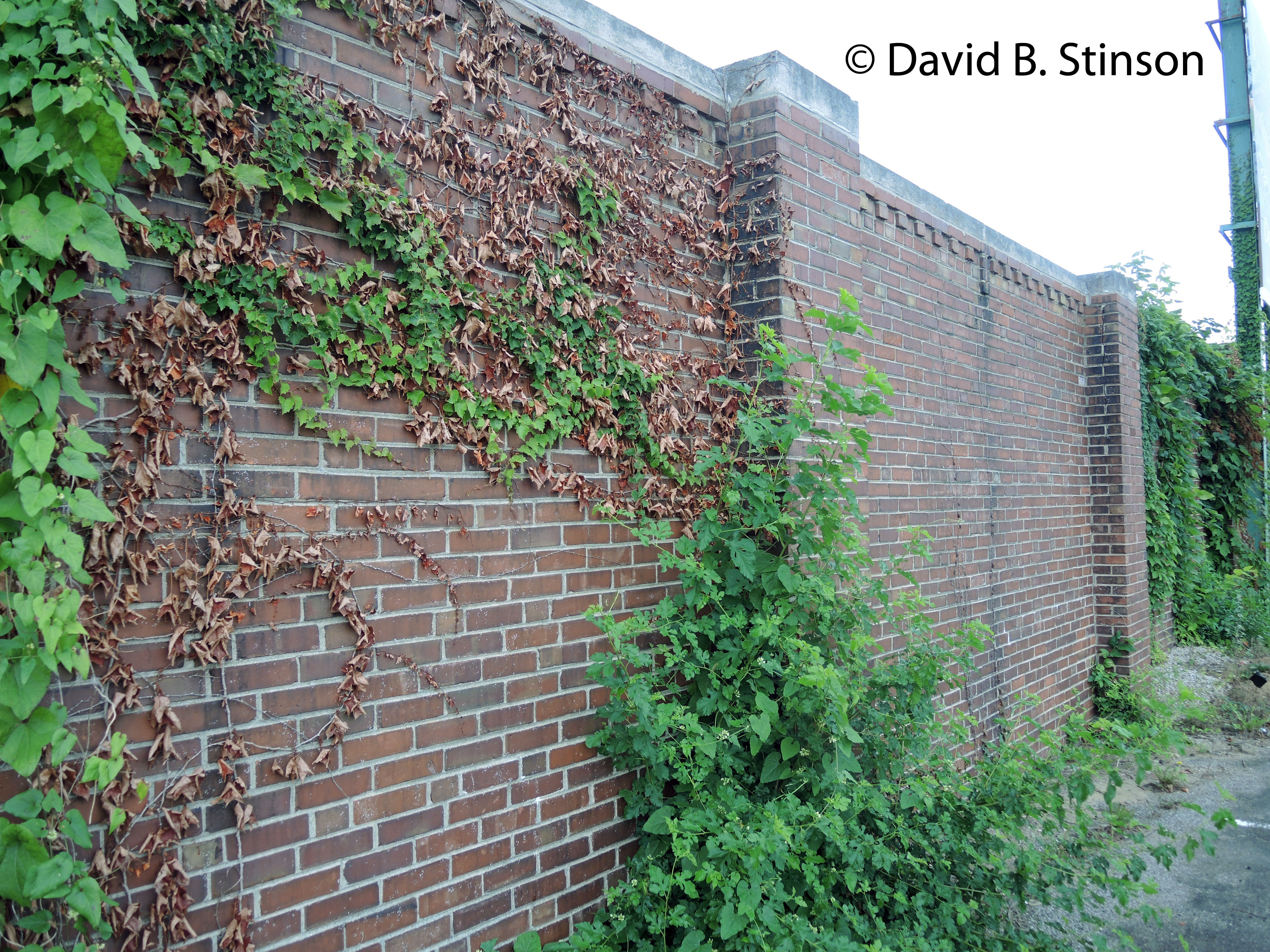 oh, my God! No padding on that thing. I remember looking out there, because I played mostly outfield myself, and I thought, man, oh man! Somebody’s gonna get killed running into that thing!
oh, my God! No padding on that thing. I remember looking out there, because I played mostly outfield myself, and I thought, man, oh man! Somebody’s gonna get killed running into that thing!
GM I ran into a few walls back then.
JH But that was a pretty big outfield also, as I recall.
GM Yes, it was. But that’s the thing: I could cover pretty much anywhere, right-center to left-center. If it was in the air, I could usually get to it.
JH Aside from that, do you feel that you got as much out of your talent as you could have?
GM Well, to be honest, I’ve always said, maybe I should have given it one more year or one more attempt, to see what would have happened. But for the most part, I’d do it all over again, and it’s an experience I’ll always treasure, because I met some really terrific people.
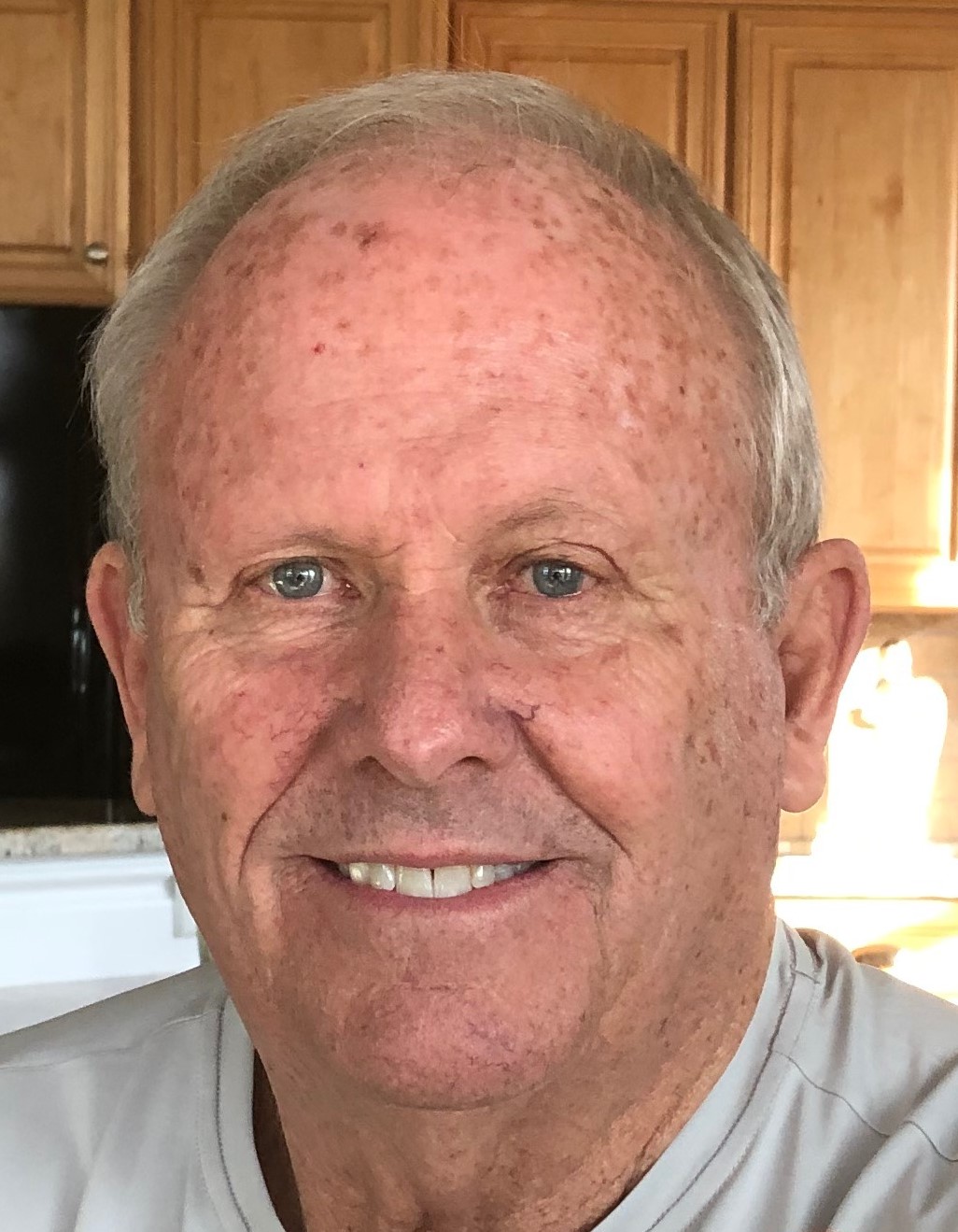
Greg is one of the best people I’ve ever met in my life. And we all from that 1975 team – he was the catalyst, to where we grew in our lives. And to a man, we all went on to have successful careers in whatever our endeavors were.
JH What made him different? What made him special as a manager that it worked so well that year, and obviously with some other years and other teams?
GM He always respected his players, and he treated you like a human being. If he saw something that would make you a better player, he let you know. And he allowed you to be yourself and go out and play and use your abilities, without constantly riding your back and trying to change everything about you.
And most of us were pretty talented, I have to admit, and he would tweak us a little bit here and there. He’d let us grow as individuals and play as a team, and that’s just the way we did. And we just started and kept going, and the more we won, the closer we got, and we just had him manage us, and he put us on the field and said, OK, go get ’em, guys, and that’s what we would do.
JH So he let you guys play; didn’t overmanage – that sort of thing?
GM And that’s one thing throughout his whole professional career, as a manager and a coach, is: he never overcoached or was overbearing. He allowed you to play and use your natural abilities. I think that was one of his greatest assets: he allowed you to be yourself.
JH You look at the 1975 Emeralds roster, and you look at all the guys who made it, and that’s quite a few for an A-ball team.
GM Yes, it was really, it was an incredibly special team. The 1975 season was special. And you know, these days, they have four or five coaches and a manager on a staff now; then, it was he and the pitching coach, and he did everything by himself.
Next time you talk to him, ask him about his USDA Choice. What that means.
Greg Riddoch USDA stands for quality meat, and that’s what he called my [batting-practice] pitching style: Meat!
GM There was a time when one of the guys fired up a joint in the back of the bus, and he stopped the bus and unloaded everybody and told us: you want to walk home? Here’s the way to do it!
He was strict in some ways, yet very fair.
JH And a guy who definitely likes to have fun.
GM Oh yeah! See, that’s the thing. Even during batting practice, we screwed around and goofed around, and he’s right there on the mound throwing batting practice every single day. And we’d make fun of him. And then we’d start hitting balls over the fence. And that’s how he got the USDA Choice name. He delivered some long balls.
JH If you can’t feel good in batting practice, when can you feel good?
GM Exactly. We took that from BP to the field during the game.
We loved playing together. We still love hanging out with each other.
And you know, Greg’s one of my best friends in life, and he knows how I feel. Part of that success that a lot of us had through Rid’s teachings, is that we went on to become successful in all our different endeavors.
JH I guess it all comes back to good fundamentals and character, then.
GM Correct.
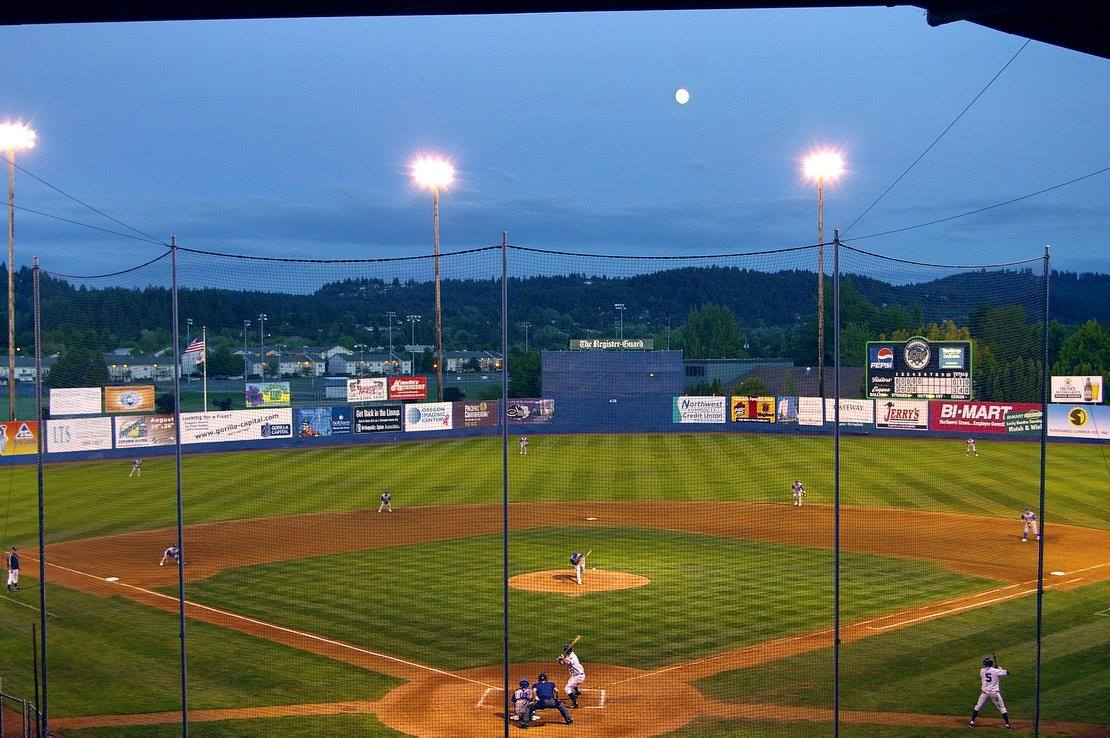
Civic Stadium in Eugene was an old, wooden ballpark that was not without its charms:
GM One thing that was pretty unique in Eugene is that whenever the Moon rose over the Dillard hills — because there were eastern hills, east of the stadium — whenever the Moon rose over the mountains, we knew we weren’t gonna lose. Nine times out of 10, we would win the game.
JH Judging from the team’s record that season, that must’ve worked an awful lot of the time.
GM It did. It was pretty incredible. When the Moon came out, we figured we were gonna win, and we usually did.
JH I was reading an article, talking about when the Emeralds moved into a different ballpark and — your old ballpark, is it still there? Have they ever actually done anything with it?
GM Well, actually, some kids about four or five years ago went inside and were playing with matches, and set it on fire and it burned down. It was a sad — it’s still a sad memory. At that time it was the tenth-oldest stadium in the country.
JH More than one of those ballparks — they were primarily wood — ended up going up in flames for one reason or another, I guess.
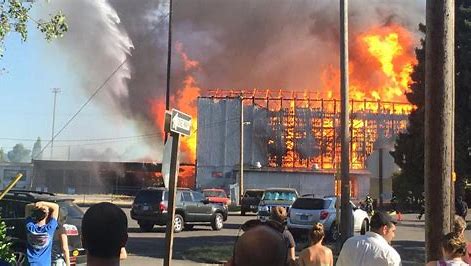
GM Yes. But yeah, ours went up because three little kids after school got into mischief and decided to set a fire in the press box, and it went up in a blaze of flames.
JH Boy, I bet it went up fast. That wood was probably old and dry and, and that would be enough by itself, just seeing that, to teach those kids a lesson, I would hope.
GM Oh, yes. Yeah. I was actually lucky. I got some pictures of it as it was going up, and it was pretty sad.
George had an unusual opportunity for a “second act” in baseball, many years after his playing career ended.
GM I don’t know if Rid told you, but he gave me my entrée back into baseball after being out of it 22 years.
JH Was that with Milwaukee?
GM Yes. See, I hadn’t been involved with pro ball for 22 years, and he invited me back in after I got out of the bowling business.
JH What years would that be, about?
GM That was — I signed with the Brewers in the fall of 1999, and I was with them until 2004.
JH And where did you work with the Brewers?
GM I worked in California in Stockton the first year, part of that year, and then I went up to Helena because they needed a hitting coach to go up and fill in up there. And then I worked with the rookies in Arizona the last three years.
JH Was that as a hitting coach or outfield coach, or like a roving instructor, or — ?
GM I started out as a hitting instructor, and going into the final year, Eddie Sedar, who was our field coordinator, asked me to help with baserunning and outfield, because basically I was a pretty good base stealer and pretty good outfielder. So he allowed me the opportunity to work in that area during spring training.
JH What led you to get out of baseball again, though?
GM Well, when I was with the Brewers and they changed the regime there, we had a guy come in, Reid Nichols. He was the new breed of minor-league field coordinator, and you couldn’t please the guy. And I’m the type of person that if you treat me with respect, I will treat you with respect. And he just didn’t do that.
And I was considered — everybody loved the way I worked in the Brewers system, but Reid and I — and I have to be honest with you — he came in primed to take credit for something Greg had started with the Brewers, and I corrected him on it, and he didn’t accept it real well. So I was on his hit-list from Day One. And that kind of soured my taste: If this was the new regime, I just didn’t want to be a part of it.
JH No, I understand. Let me give you a couple of names from the Brewers around the same time. Did you ever cross paths or work with Steve Foucault or Wayne Krenchicki?
GM No, they were after me, I believe.
JH It was close to similar years, and they also sorta got kicked out the door for the same reason.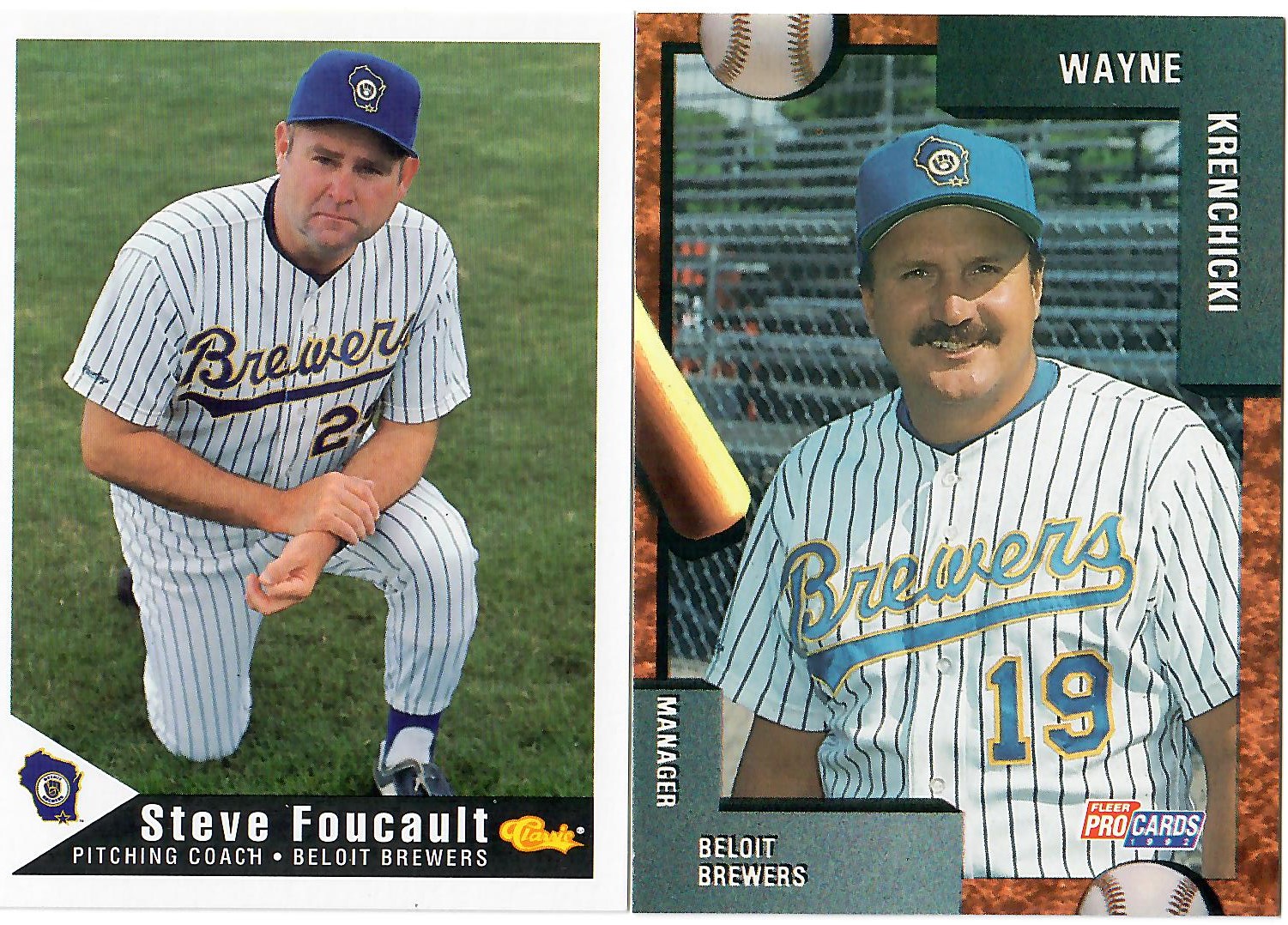 They were in Beloit and the Arizona Fall League. And they were manager and pitching coach together for — actually that’s where they got put together. And they ended up doing a bunch of years in independent ball with two or three different teams together, after they were sort of kicked out of the Brewers in the same fashion.
They were in Beloit and the Arizona Fall League. And they were manager and pitching coach together for — actually that’s where they got put together. And they ended up doing a bunch of years in independent ball with two or three different teams together, after they were sort of kicked out of the Brewers in the same fashion.
GM When you said Beloit, that was before I was there. Because when I was there, we were in Helena and Arizona and I forget where A-ball – well, one was California.
JH Yeah, the Stockton Ports.
GM Yeah. You know, Cecil Cooper was there. Eddie Sedar, those guys were there, and Mark Littell. Of course. Tony Muser and then Mike Caldwell.
JH Was that too early for the wave of Ryan Braun and Corey Hart and Prince Fielder and those guys?
GM No, actually, believe it or not, I signed [Brewers second-baseman] Rickie Weeks to his first professional contract, because they had forgotten to have him sign his contract in Milwaukee. So when he came to Arizona, they asked me to have him sign the contract, because he couldn’t play unless he signed that. For the time he was there, we got to know each other pretty good. That’s a pretty good guy.
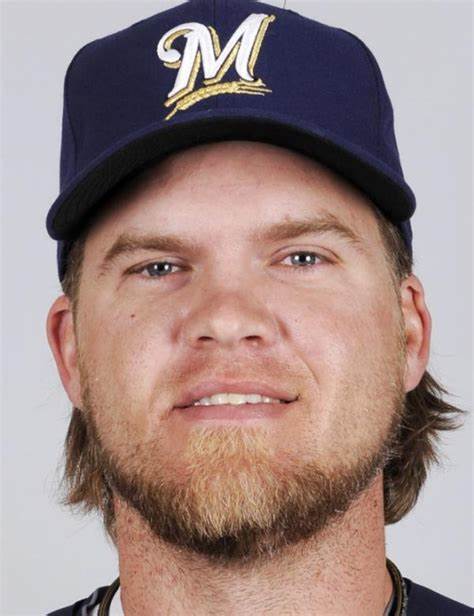
And Fielder, we signed him while I was there, because we signed him the year before we signed Weeks. And Corey Hart, I actually coached Corey in Utah.
JH I was working in Wisconsin when those guys were coming up. All the big talk was, we don’t want to rush these guys. And they slowly started coming in. But it seemed like they did the right thing in not rushing them, because they were all pretty successful. And they wanted to kind of bring them along as a group, and you’d hear about what they were doing in AA or somebody was now in AAA. And that whole core, except for Braun I guess, is all gone. But they had quite a collection of talent coming along at the same time there.
GM Well, and that was the sad part when they let Rid go, because we were developing a mighty good minor-league system. Because he had had the scouting department and the coaching staffs, we all worked really well, and you could see the beginnings of good things to come.
And it was sad, because Rid was like myself and a lot of the players that were part of the Reds organization during the mid-1970s and when the Big Red Machine was around, and how they coached and how they worked with players. And that’s what we were instilling in Milwaukee at the time.
JH He told me that he was shocked when he got to Milwaukee and there wasn’t a consistent way to teach any part of anything. Double plays, relays, cutoffs — nothing. And that there wasn’t a consistent playbook; none of that stuff. And that was what part of what he was trying to work on and get consistent.
GM Exactly.
JH So that if a kid was in A-ball, AAA, or the majors, he would already know how they wanted rundowns worked or cutoffs or relays, any of that stuff — that it would be taught consistently throughout the system.
GM Exactly.
JH But they didn’t have that, and he ran into problems and resistance trying to get that started.
GM Oh yes, I remember well.
JH And then you get a new regime and the whole thing apparently went to hell in a handbasket, teaching-wise?
GM Yes. Yep.
JH That’s the kind of thing that could set an organization back years.
GM Yeah. Well, it did there. I guess they’re starting to play a little better now, but you know, there was a good thing going and it was really sad when [Brewers GM] Dean Taylor was let go. Which of course meant that Rid and all of us basically were let go, because we were part of that group. The new guys didn’t want any of the old, like I said: Reid to take credit for what Greg had already instilled. And you know, it just escalated. And all the good guys that were there at the time ended up leaving.
JH You know, really Chicki and Fookie got caught in the same trap of new-regime-came-in and it was, okay, you’ve got me working with these kids in A-ball. Do you want to develop players, or do you want to win?” And Chicki was trying to develop players and they didn’t think he won enough, even though he made the playoffs two out of three years he was in A-ball. And so they finally said, see you later.
GM You know, that’s pretty good. Two out of three years developing and going to the playoffs.
JH He made the playoffs, but I guess they got mixed messages about, look, are we developing players or are we going to do everything to win? And you know the front office is gonna win out in that kind of deal, no matter how wrong they might be.
GM Exactly. That’s what was unique about Greg, is that he and Dean had worked together prior to that. And Dean understood that Greg knew what he was talking about, and his development skills, and what he had learned from the Reds he was instilling in the Brewers. And from the bottom to the top, everybody had taken into believing it, and you could see the progress. And that’s just another one of those things where I’m sure Greg would tell you that it was something that the politics of baseball ruined it.
JH I wanted to cover baseball and broadcast it; never got the chance to do that. And Greg said, look, you would never have lasted. You wouldn’t have been able to take all the politics and infighting and the crap that goes on. Just count your blessings that you really didn’t get into baseball that deep.
GM Yeah. And you know, to a large degree, he’s correct about that. Because it’s a dog-eat-dog world, and if you play along with the higher-ups, you’ll hang around. If you buck the system or give your own opinion, see, they don’t like you giving your own opinion.
The Emeralds now play in PK Park on the Oregon campus. George is a fixture at the ballpark.
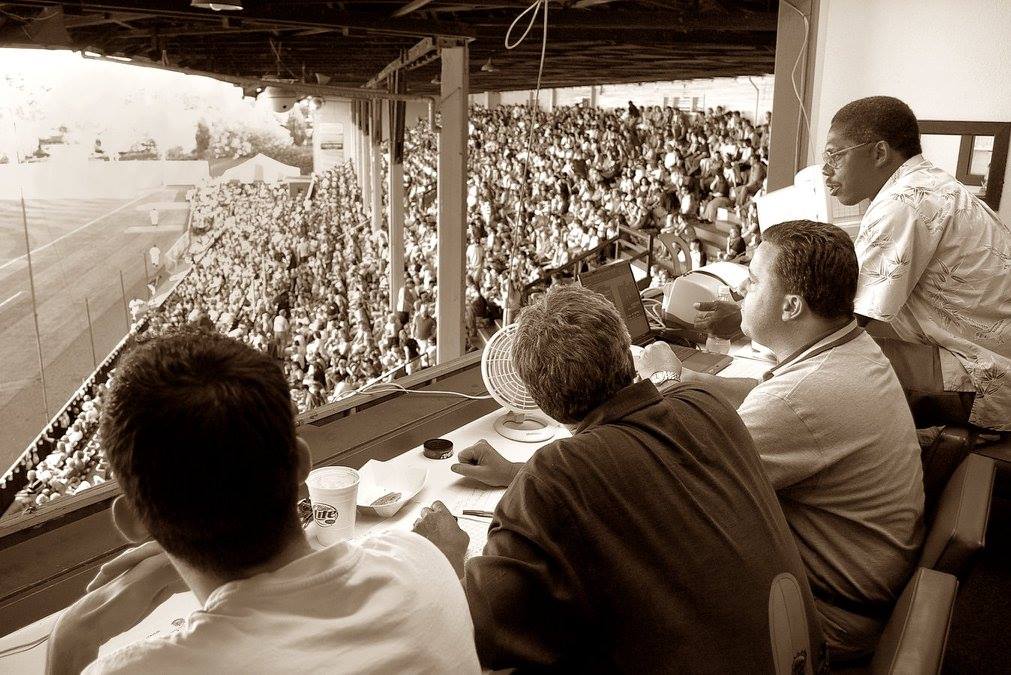
JH Are you still the official scorer out there?
GM Yes.
JH So you’re still kind of keeping your hand in there a little bit?
GM Oh yeah. I do that, and then I do a little bit of hitting instruction on occasion. So I keep in touch with the game. It’s still the love of my life.
JH I saw in the same article, you said, I had a choice between getting married and baseball, and I chose baseball.
GM Yeah.
JH Wow! [laughs]
GM Yes, I did. Well, I figured you could get married anytime, but baseball only comes around once in life.
JH Yeah, it certainly does. And it grabs hold of all of us, and won’t let go. But how is life an official scorer in A-ball?
GM Actually, it’s – well, see, I’m one of the few that actually have ever played the game in the Northwest League and know the rules. So I butt heads a lot with the managers and coaches of other teams, because you’d be surprised how many of them don’t really know the rules. So we butt heads on occasion.
JH Have you ever been known to get the wrath of the manager when you call what’s really an error an error, and they want a little home-cooking or something like that?
GM Oh yeah! Yes, I have!
JH Imagine that! [laughter]
GM Not very often. To be honest with you, the home manager and coaching staffs, there’s only been a couple instances, and I’ve been doing this for 15 years, so there’s only been a couple of instances where they’ve gone ballistic on me. And I just pull out the rule book and show them and say, here’s the rule, and this is why I made the call the way I made it.
JH So they don’t get on you too much for a hit-versus-error kind of thing, or something like that?
GM No, they trust me pretty well here, and I’m pretty well-known in the League because I’ve been here for so long that they know that I know the game.
JH So you find that that a number of the people don’t really know the rule book. And so when something unusual comes up, they don’t understand the call that’s made.
GM Yes.
JH I guess they must not be studying that thing in the offseason or whatever. Maybe they think they know more than they do.
GM Well, it’s usually on a judgment call and it’s usually one that — it could go either way. To give you an example: there have been the kind where a ball’s hit in the first inning or something, and it’s at the third-base line. The guy tries to backhand it, and can’t make the play, and I’ll give him a hit. Or there’ll be another ball, where he should make that play, and he gets an error and the pitcher goes on to throw a really good game, like a one- or two-hitter. And I’ve had managers asking me to change the call so he could get a no-no. It doesn’t work that way.
JH So you’re not subscribing to that necessarily to that old thing about the first hit has to be a completely clean hit.
GM No.
JH Well, that’s good. I mean it either it is a hit or it isn’t. And it really should be the same call in the first inning or the ninth: if the guy should make the play, you know, make the play.
GM And that’s the way I call it. I call it as I see it at the moment, and Greg will tell you I’m fair to a fault. Because he’s coached and managed here, and he’s wondered about a few calls, and I’ll explain to him why I’ve made the call. And just like I do with the whole manager and coaching staffs here, because I go into the clubhouse every night after the game and ask him, is there anything you guys want to discuss? And they’re usually pretty cordial. And if they can prove, discuss a point and I listen to them and that it’s viable, there are times where I can change the call.
JH Well, I guess if you make yourself available, and you’re professional about it, that should gain you some traction with those guys, to where they don’t think it’s, oh, the guy doesn’t know what he’s doing, and he’s hiding up there in the press box and that kind of thing. You’re out there and available to talk about it.
GM Oh yeah. And you know, and it’s just like with the visiting teams, I always give the managers my phone so they can call me right after the game if they have a question about a call, and I’ll explain to him why I make a certain call. Or you know, there’s times when they want you to tweak the results a little bit. And if they’ve got a legitimate case, I’ll even ask my assistant up there if they think that the guy has a legitimate gripe, and we’ll discuss it. And if they think that it could have gone either way, there’s times when I’ll change a call, but it’s not very often. I try and be fair and honest with everybody that’s involved.
JH You say you’ve done this 15 years. Do you intend to keep going for a while?
GM Yeah. You know, I love the game. If I was young enough, I’d still try to play it. But it’s part of my life, and I love doing it. I enjoy it.
JH Good for you! Nothing like a baseball lifer.
GM Yup.
JH You were kiddingly known as The Mayor of Eugene when you played. But have you ever considered getting involved in political office?
JH You’re too smart for that.
GM Yeah. [laughter]
JH You probably had enough politics playing ball. But you have stayed in Eugene: the lumber business, the bowling business, and then into accounting.
GM Yes. tax prep. Yeah.
JH You studied that at San Diego State, right?
GM Yes, I was a business major.
JH And what led you to get into tax prep?
GM After I got out of baseball the second time, I didn’t know what I really wanted to do. So I decided to go back to school and get my license, because I’d always been doing everybody’s tax returns anyway. So to do it legally, I went to school to get my license. And here I am. I’m still doing that since the mid-2000s.
JH Any plans to retire anytime soon?
GM I don’t know, because to be honest with you, I love doing taxes. I love that I have a great clientele and it keeps me busy, keeps me out of trouble. So I enjoy it. In the next three, four years, maybe —
JH But as far as you know, you’re gonna keep scoring games and keep preparing taxes. A reasonably full slate then, I guess.
GM This year [2020] has been incredible. I think I did my last tax return in the middle of December. It just kept dragging out because people just didn’t commit, because they didn’t know what was going to happen. And they’ll start up again in January.
JH It takes a certain mindset — a certain aptitude — to be able to do that. I speak as one who bombed out of Accounting I twice, when I was briefly a business major in college. Debits and credits and balance statements and balance sheets and all that, they didn’t get along with me, somehow. But hey, if you can figure that stuff out more, more power to you! [more laughter]
GM Well, you have to take it literally — straight on, as what you see is what it is. The crazy thing is, you can’t read anything into it. You literally take the numbers as they — once you learn debits and credits, then it gets a lot easier. But I was like you in the beginning. I go, that doesn’t make sense.
JH I just could not wrap my head around that stuff. And that’s why the world has people like you, George, and more power to you. Just tell me where to sign! [laughs]
GM Well, that’s the way I am, because I do taxes like I played baseball: I’m a perfectionist. I don’t like to make mistakes. So that’s built the trust up in the people I do taxes for, because they know that I’m going to go a hundred percent and make sure I give them the best opportunity to get a refund and save them money.
JH Does it take a while to build that trust with most folks, do you think?
GM Yes, yes it does. After the first year or two, and they see that you’re accurate and knowledgeable, you pretty much built a pretty good rapport.
JH And it sounds like you get plenty of word-of-mouth and that sort of thing, that you’ve been able to sustain this for 15-20 years.
GM Yes. Yes. I get a lot of word-of-mouth and plus, because of my business background, my boss will give me most of the business people that come into the office because she knows that I have a pretty good background and a lot of answers for people who are just starting out.
Although injuries curtailed George’s dreams of playing in the big leagues, he found an adopted home in the Pacific Northwest:
GM Eugene was my major leagues. Even if I never went anywhere else, I always consider Eugene my major leagues. Because it’s true: I could have run for mayor in 1975 and I just — that’s why I’m still here. I love the city. I grew up in San Diego, but once I got here, I fell in love with the town and the people, and I just decided, this is where I want to be. It’s a fantastic place to live.
Excerpted from my book The Little Red Wagon: The 1975 Eugene Emeralds.

